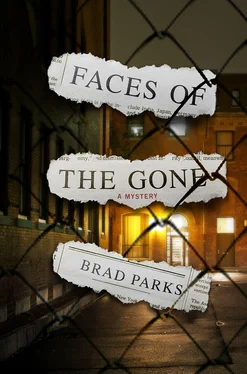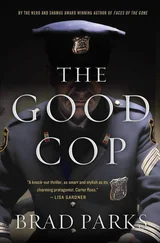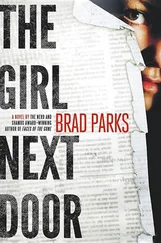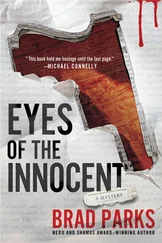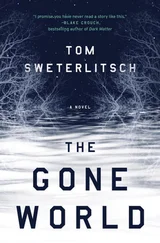Brad Parks - Faces of the Gone
Здесь есть возможность читать онлайн «Brad Parks - Faces of the Gone» весь текст электронной книги совершенно бесплатно (целиком полную версию без сокращений). В некоторых случаях можно слушать аудио, скачать через торрент в формате fb2 и присутствует краткое содержание. Год выпуска: 2010, ISBN: 2010, Издательство: Minotaur Books, Жанр: Триллер, на английском языке. Описание произведения, (предисловие) а так же отзывы посетителей доступны на портале библиотеки ЛибКат.
- Название:Faces of the Gone
- Автор:
- Издательство:Minotaur Books
- Жанр:
- Год:2010
- ISBN:9780312574772
- Рейтинг книги:3 / 5. Голосов: 1
-
Избранное:Добавить в избранное
- Отзывы:
-
Ваша оценка:
- 60
- 1
- 2
- 3
- 4
- 5
Faces of the Gone: краткое содержание, описание и аннотация
Предлагаем к чтению аннотацию, описание, краткое содержание или предисловие (зависит от того, что написал сам автор книги «Faces of the Gone»). Если вы не нашли необходимую информацию о книге — напишите в комментариях, мы постараемся отыскать её.
Faces of the Gone — читать онлайн бесплатно полную книгу (весь текст) целиком
Ниже представлен текст книги, разбитый по страницам. Система сохранения места последней прочитанной страницы, позволяет с удобством читать онлайн бесплатно книгу «Faces of the Gone», без необходимости каждый раз заново искать на чём Вы остановились. Поставьте закладку, и сможете в любой момент перейти на страницу, на которой закончили чтение.
Интервал:
Закладка:
So all I could do as I drove back toward the world headquarters of the Eagle-Examiner was thank the karma. It was a pleasant feeling: the success of a hard day’s reporting, the warmth of my Malibu, the buzz in my left thigh. .
No, wait, that was my cell phone. It was Tommy.
“You won’t believe the luck I had.” His voice came bounding out of the earpiece.
“You finally had a threesome with the Hardy Boys?”
“Who are the Hardy Boys? You have gay friends you didn’t tell me about?”
“They’re. . never mind. What’s going on?”
“Well,” Tommy said. “I was hanging around Shareef’s neighborhood, just hanging around, looking for people to talk to, and this white kid pulls up in his daddy’s Pathfinder and asks if I know where I can find Eef.”
Huh? I pressed my ear harder against the phone. “Eef?”
“No, you idiot. RRRRReef. As in ‘Shareef.’ Try to keep up.”
“Sorry.”
“So anyway,” Tommy continued, “I play it all coy and I’m like, ‘Who’s asking.’ And this guy is like, ‘I hear he’s got The Stuff.’ And I’m like, ‘By The Stuff do you mean stuff? Or THE Stuff?’ And the guy is like, ‘Yeah, THE Stuff.’ ”
Apparently I wasn’t the only one with good reporting karma.
“Anyway, this idiot kid thought I worked for Shareef or something, so he practically starts telling me his whole life story. He came from some high school in the suburbs-Livingston, I think-because word is out that this dealer named Reef was selling the best heroin ever and it was called ‘The Stuff.’ How’s that for confirmation?” Tommy asked.
“Pretty good,” I replied. “Thank you.”
“You’re welcome. But I got more,” Tommy said. “I asked around the neighborhood a little more and apparently Shareef pretty much made a living selling to suburban kids. He would just hang out all day in that pimp-daddy Chrysler of his and wait for the SUVs to drive up.”
It made sense. Shareef’s neighborhood was right near the intersection of the Garden State Parkway and Route 280. Both roads led rather rapidly to a nearly infinite supply of rich suburban kids.
“I was thinking,” Tommy said. “This probably means we can rule out Shareef being killed in some kind of turf battle, don’t you think?”
“How so?”
“Well, it seems like Shareef didn’t even have a turf. His turf was his car. Wherever he went, those idiot kids were going to find him. I mean, the kid I talked to was driving around looking for him.”
I pulled into the company parking garage, letting the new information rattle around in my head for a bit. Sometimes when you’re working on a story, it can be difficult to parse data as it comes, to see both the trees and the forest simultaneously.
But this time the big picture was becoming pretty clear to me. None of the Ludlow Four were killed because of turf. The cause of death, proximate or otherwise, had to be the one thing they shared: selling The Stuff.
“Good work, Tommy,” I said. “Now, if you’ll excuse me, I have to go tell Sal Szanto his bar story is deader than disco.”
It was past seven by the time I strolled into the newsroom. The reporters were starting to thin out, but the copy desk was humming through the process of assembling Thursday’s newspaper, doing what copy desks have always done: think up misleading headlines, add mistakes into stories, and devise new ways to muddle clean writing.
No, actually, I’m a big fan of our desk. There were some odd ducks-as is often the case among people who think 4 P.M. is early in the day-but by and large they were solid, dependable folks who could spot a typo at twenty paces and delight in having won the New Jersey State spelling bee six years running. Collectively, they edited the equivalent of a novel every night.
I paused briefly at my desk-turned-drug-shrine-someone had left me a copy of High Times, the stoner magazine-then continued on toward Szanto’s office. I might as well let him scream at me when there were fewer people around to hear it.
“Got a second, boss?” I asked, tapping gently on the frame to his open office door.
Szanto glanced up from his computer screen, aggrieved by the combination of Tums and Maxwell House sloshing around in his stomach.
“Srrtt,” he grunted.
I was uncertain whether he was trying to say “sure” or “sit”-I had left my Szanto-English dictionary behind-but I took it as an invitation to come in.
“Jsss gvvmmm scccdd.”
Szanto’s attention had turned back to his screen, where he was trying to lay hands on some abysmal piece of copy. We had some very good writers at our paper, people who made words dance on a page. We also had people who wrote as if full sentences hadn’t been discovered yet.
“Jzzss Krrsst,” Szanto mumbled through a sigh, then coughed, rattling loose the small amphibian that was trying to apply for residence in his throat. “What the hell are they teaching in journalism school these days? You should see this crap.”
I waited patiently. Szanto grimaced and grumbled for a few more minutes, then finally sent the story over to the copy desk with an emphatic “Aw, screw it.”
“It’ll be lining hamster cages by tomorrow afternoon anyway,” I said, trying to be helpful. Szanto grunted again.
“Okay,” he said, “what can I do for my star investigative reporter? Making good progress with the bar thing?”
In an effort to keep our discourse on a civil tone, I tried to say my next sentence in as small a voice as possible.
“Sal, the bar isn’t the story.”
My efforts failed. Szanto launched a string of obscenities so long and so loud it was difficult to untangle one from the other. All I know is I heard a thorough exercising of the Seven Words You Can Never Say on Television, including one in particular he used as a noun, verb, adverb, and adjective-all in the same sentence. He drew a breath and was about to relaunch when I put a halt to it with the Four Words Every Editor Loves to Hear:
“Boss, I got something.”
He let the air leak out of his lungs, then tilted his head to listen.
“I’ve got the link between the Ludlow Four,” I continued, getting up from my seat and walking over to the map of Newark he had on his side wall.
“It isn’t geography,” I said, then began pointing to different spots on the map. “Wanda Bass sold out of a go-go bar in Irvington. Tyrone Scott worked in and around a chicken shack on South Orange Avenue. Devin Whitehead was a Clinton Hill kid. And Shareef Thomas lived up off Central Avenue near the cemetery.
“It’s not clientele, either,” I continued as I returned to my seat. “Wanda sold to a hooker friend’s clients and whoever else wandered into her go-go bar. Tyrone sold to junkies and beat-up old homeless people at an abandoned housing project. Devin sold to guys in the neighborhood. Shareef sold to suburban white kids.”
Szanto was listening silently.
“The link,” I said, drawing it out a little bit, “is the brand of heroin they sold.”
I fished into my pocket and brought out my samples of The Stuff. I flipped one of the bags across Szanto’s desk.
“I found this in Wanda Bass’s apartment,” I said. “She had been selling it to clients at the go-go bar where she worked. Notice the stamp on it.”
As Szanto grabbed it and began examining the signature eagle-clutching-syringe logo, I held up the torn dime bag.
“I got this from a junkie who said she bought it from Tyrone Scott. It’s got the same stamp.”
Szanto squinted across his desk and I handed him the torn bag.
“I’ll be damned,” he said.
“As for the other two, I’ve got a very good source in Devin Whitehead’s neighborhood who talked to some local miscreants for me, and they all said Devin’s brand was called ‘The Stuff.’ Tommy spent a lot of time around Shareef Thomas’s haunt and found a kid wandering around looking for a guy named ‘Reef’ who sold a brand called ‘The Stuff.’ ”
Читать дальшеИнтервал:
Закладка:
Похожие книги на «Faces of the Gone»
Представляем Вашему вниманию похожие книги на «Faces of the Gone» списком для выбора. Мы отобрали схожую по названию и смыслу литературу в надежде предоставить читателям больше вариантов отыскать новые, интересные, ещё непрочитанные произведения.
Обсуждение, отзывы о книге «Faces of the Gone» и просто собственные мнения читателей. Оставьте ваши комментарии, напишите, что Вы думаете о произведении, его смысле или главных героях. Укажите что конкретно понравилось, а что нет, и почему Вы так считаете.
